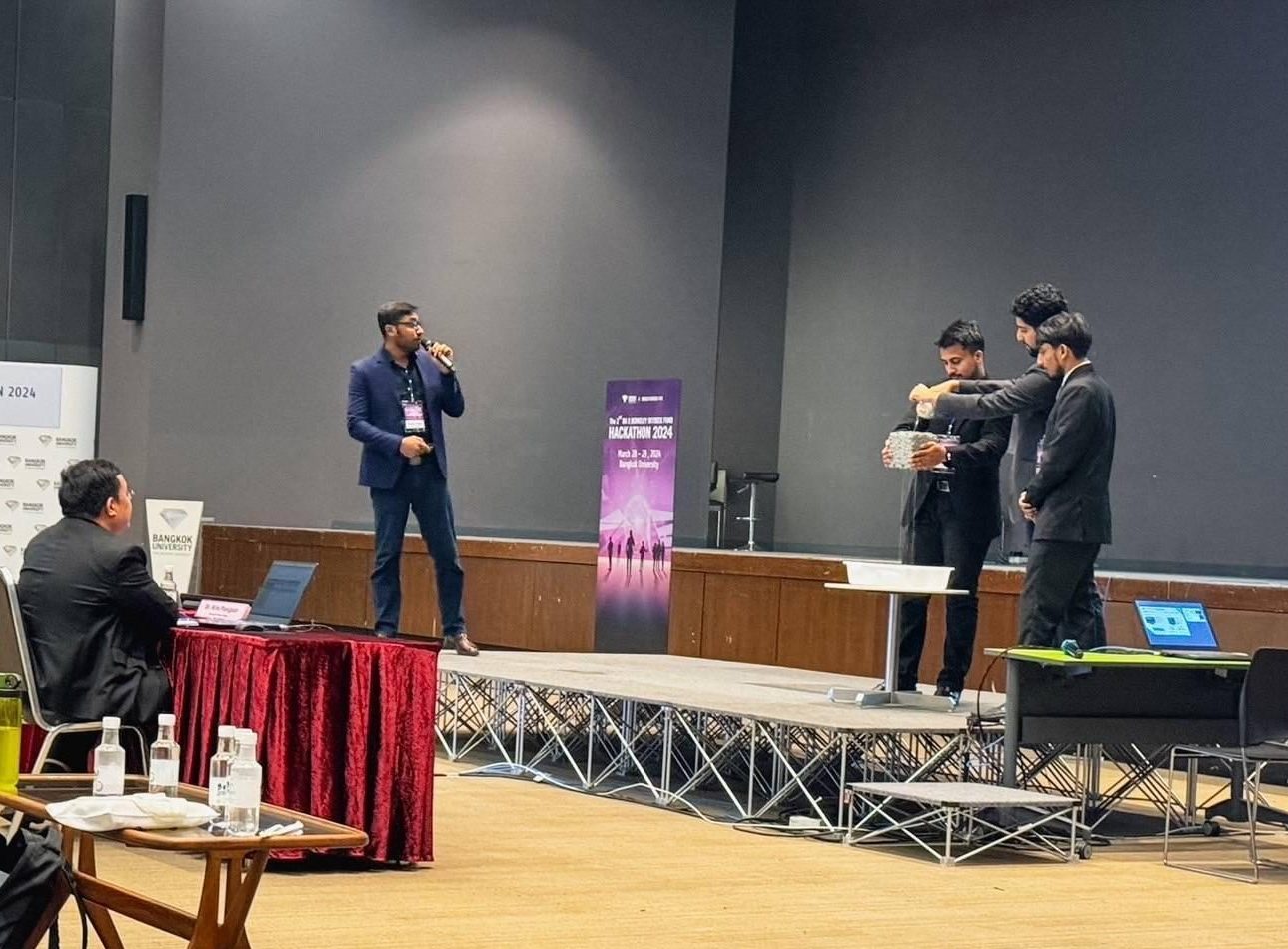12 March 2024: Amidst rapid urbanization, Nepal faces high levels of risk from climate change impacts; it ranks fourth in terms of vulnerability and faces losing 2.2% of its annual GDP due to climate change by 2050. Authorities, particularly local governments, face tremendous gaps in knowledge, data, capacity, and financial resources to implement adaptation strategies and actions to safeguard lives, livelihoods, and the environment.
On March 12, 2024, the Asian Institute of Technology partnered with the National Dialogue on Climate Change organized by the Municipal Association of Nepal (MuAN) in Kathmandu, Nepal. The dialogue aimed to enhance understanding among municipal leaders about climate change, advocate for inter-governmental and inter-sectoral collaboration, and facilitate discussions to translate policies into actionable plans at the municipal level. The event featured an opening keynote session and two-panel discussions on challenges, initiatives, lessons, and future actions on climate change in Nepal.

Participants of the National Dialogue on Climate Change held on 12 March 2024 in Kathmandu, Nepal
The opening session, presided over by Mr. Bhim Prasad Dhungana, President of MuAN, featured a welcome address from Mr. Krishna Prasad Sapkota, Vice President of MuAN, who emphasized the dire consequences of climate change in vulnerable communities in Nepal and urged the empowerment of local governments (municipalities) with adequate finance and resources to address challenges posed by climate change. Dr. Buddi Sagar Poudel, Joint Secretary of MoFE, in his keynote presentation, outlined Nepal’s climate change strategy, emphasizing global context, national policies, and the local government’s role. He emphasized the importance of a ‘whole of society’ approach, advocating for collaboration between all levels of government, the private sector, the media, and civil society organizations.
Hon. Ram Hari Khatiwada, Chairperson of the State Affairs and Good Governance Committee of the Parliament of Nepal chaired the first panel discussion session titled “Coordinated Approach for Climate Governance.” In the session, representatives and experts, including Mr. Ghanshyam Pandey, Former Mayor of Tulsipur Sub Metropolitan City; Mr. Kashiraj Dahal, Constitutional and Administrative Expert; Mr. Suman Dahal, Joint Secretary at the Ministry of Federal Affairs and General Administration; and Mr. Upendra Karki, Mayor of Kageshwari Manohara Municipality, discussed the role of inclusive governance and coordination among different levels of government to tackle climate change, moderated by Mr. Kalanidhi Devkota, Executive Director of MuAN.

Experts during the 1st Panel Discussion Session (from left: Mr. Upendra Karki, Mr. Kashiraj Dahal, Hon. Ram Hari Khatiwada, Mr. Ghanashyam Pandey, Mr. Suman Dahal and Mr. Kalanidhi Devkota)
Panelists cited a lack of awareness, fragmented policies, resources, and priorities, and ambiguity in roles and responsibilities among the government entities as critical issues hindering climate action. They called for unanimous understanding and commitment to global climate change and sustainable development goals, mainstreaming of climate change in development policies through thematic segregation, and translation of national mitigation and adaptation plans into actionable strategies for implementation by local governments, owing to their priorities and capacity.
The second panel discussed “Program, Innovation, and Investment for Climate Change Adaptation,” with Hon. Balananda Poudel, Chairperson of the National Natural Resources and Fiscal Commission of Nepal, serving as the panel’s chair and Mr. Man Thapa serving as the panel’s moderator. The panelists included Dr. Dila Sangraula, Chairperson of the Center for Democracy and Development; Mr. Somlal Subedi, Former Chief Secretary of Nepal; Mr. Krishna Bahadur Rana Magar, Mayor of Gorkha Municipality; Dr. Basanta Raj Adhikari, Director of the Center for Disaster Studies at Tribhuvan University; and Dr. Nibha Shrestha, Head of Programme at Oxfam Nepal.

Experts during the 2nd Panel Discussion Session (from left: Mr. Man Thapa, Mr. Krishna Bahadur Rana Magar, Dr. Dila Sangraula, Hon. Balananda Poudel, Mr. Somlal Subedi, Dr. Basanta Raj Adhikari and Dr. Nibha Shrestha)
Experts discussed the disproportionate impacts of climate change on women, children, and marginalized groups and the knowledge gaps and resource limitations that constrain municipalities from actively engaging in climate change adaptation. They emphasized enhancing formal education and vocational training in climate change and involving development partners and civil society to strengthen community capacity, raise awareness, and promote individual actions. Furthermore, panelists stressed investing in innovative technologies for vulnerability assessments, early warning systems, and risk-informed planning to empower municipalities with data-driven insights for effective climate mitigation and adaptation.
During the event, Mr. Ayush Baskota, Project Management Officer at the AIT School of Environment Resources and Development, demonstrated CRISTA (Climate Resilient Infrastructure for Social Transformation and Adaptation) system to distinguished guests, including Hon. Minister Joshi and representatives from several municipalities across Nepal. CRISTA, developed by the Disaster Preparedness, Mitigation and Management Program (DPMM) at AIT with support from the Asian Disaster Preparedness Center, is an innovative critical infrastructure risk management system that enables local authorities to assess climate-induced vulnerabilities to road and power infrastructure, monitor damages and disruptions in real-time and implement response and risk mitigation measures to boost climate adaptation in Nepal.

Hon. Bhanubhakta Joshi, Minister of Federal Affairs and General Administration of Government of Nepal (first from left) listens on as Mr. Ayush Baskota, Project Management Officer, SERD, AIT describes the CRISTA system and its potential contribution to enhancing climate resilience of critical infrastructure in Nepal.
Hon. Bhanubhakta Joshi, Minister of Federal Affairs and General Administration of the Government of Nepal served as the chief guest at the dialogue’s closing ceremony, which coincided with MuAN’s 31st anniversary celebrations. Mr. Kalanidhi Devkota, Executive Director of MuAN, briefed the key takeaways of the dialogue. Minister Joshi remarked on the important role of municipalities in governance and expressed commitment towards strengthening collaboration across the federal structure and supporting local governments to enact national and global development goals, including climate change mitigation and adaptation.
The “National Dialogue on Climate Change” in Kathmandu, Nepal, has showcased the urgent need for collaborative solutions to combat the impacts of climate change, particularly in vulnerable regions like Nepal. With the Asian Institute of Technology (AIT) playing a crucial role, the dialogue served as a platform for sharing knowledge, fostering inter-governmental and inter-sectoral collaborations, and discussing innovative strategies to enhance climate resilience. The discussions, led by experts and policymakers, have underlined the significance of empowering local governments with the necessary resources, data, and technologies, such as the CRISTA system developed by AIT. This collaborative effort exemplifies the imperative to integrate global objectives with local actions, highlighting the event not just as a dialogue but as a stepping stone towards actionable, sustainable climate resilience strategies in Nepal.








